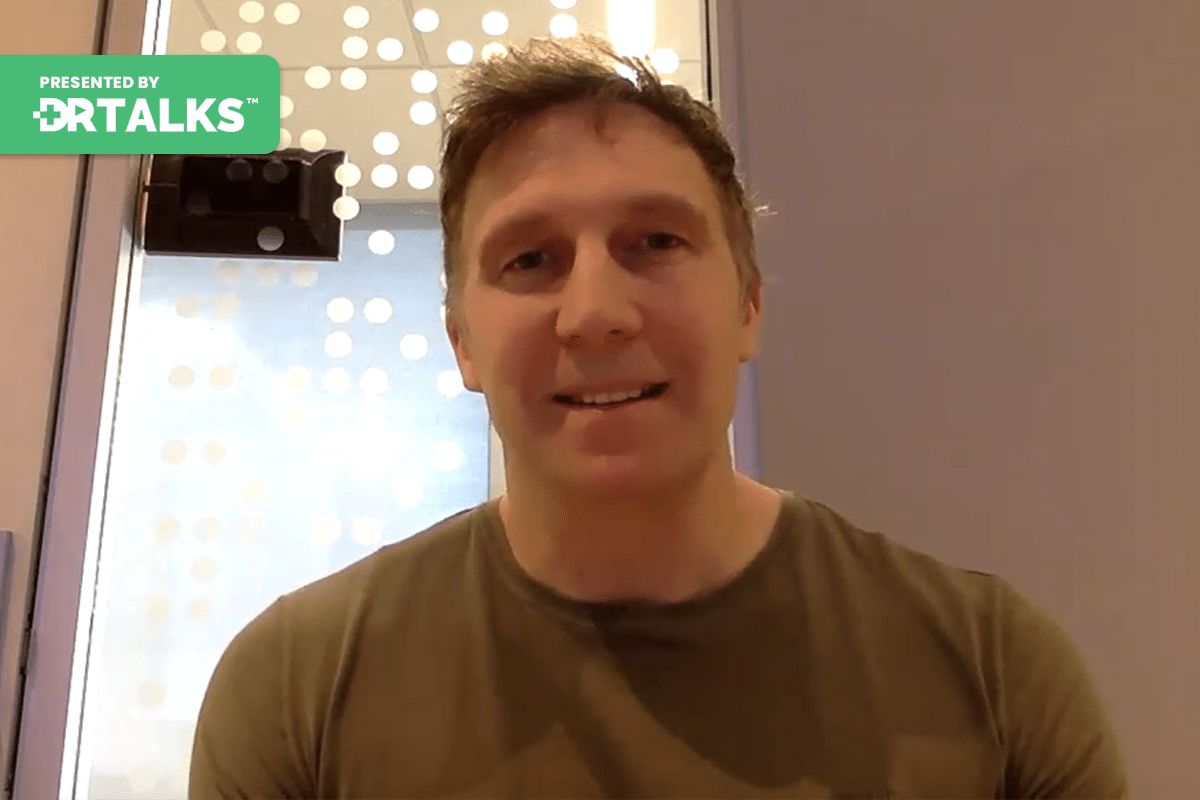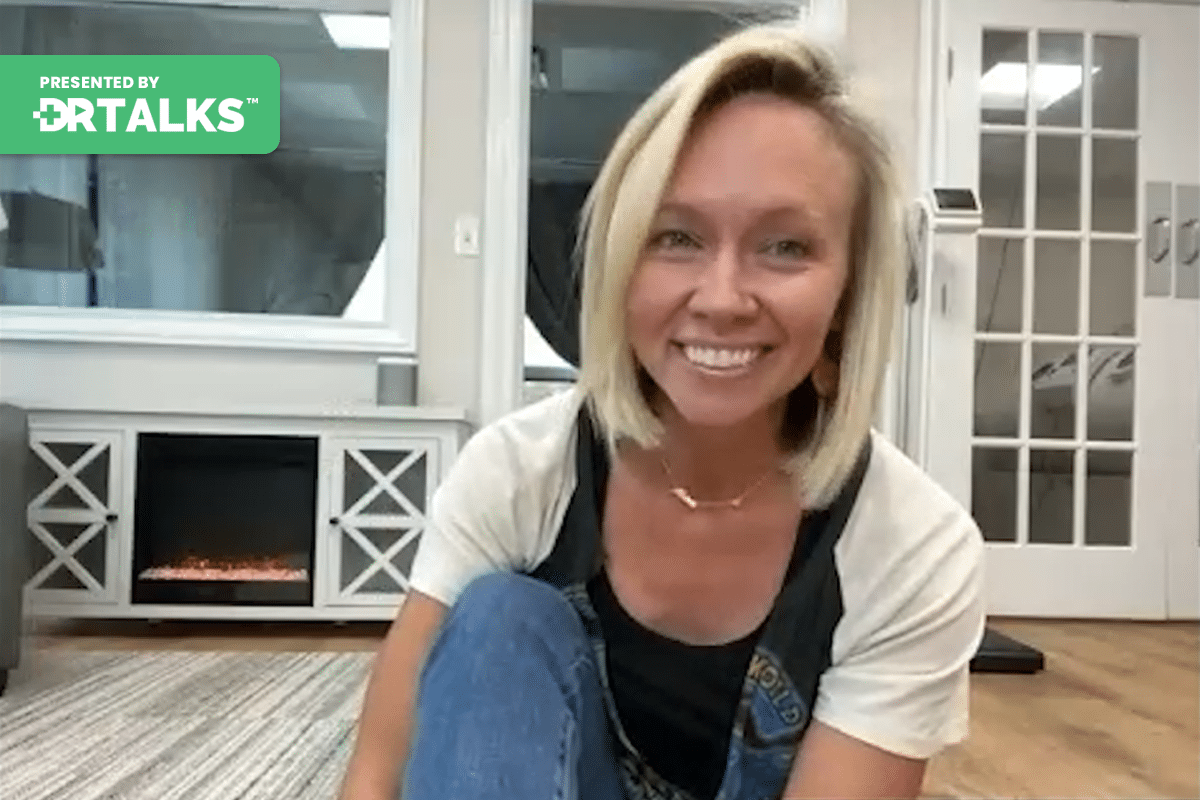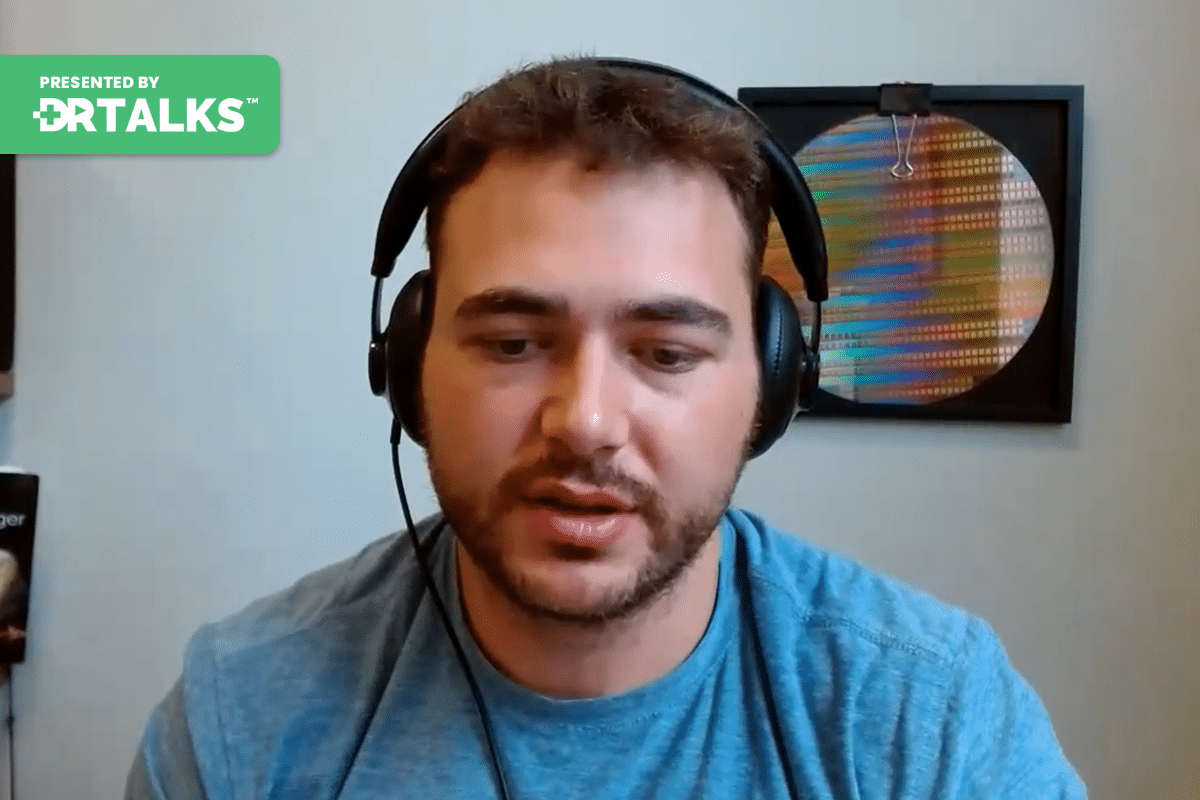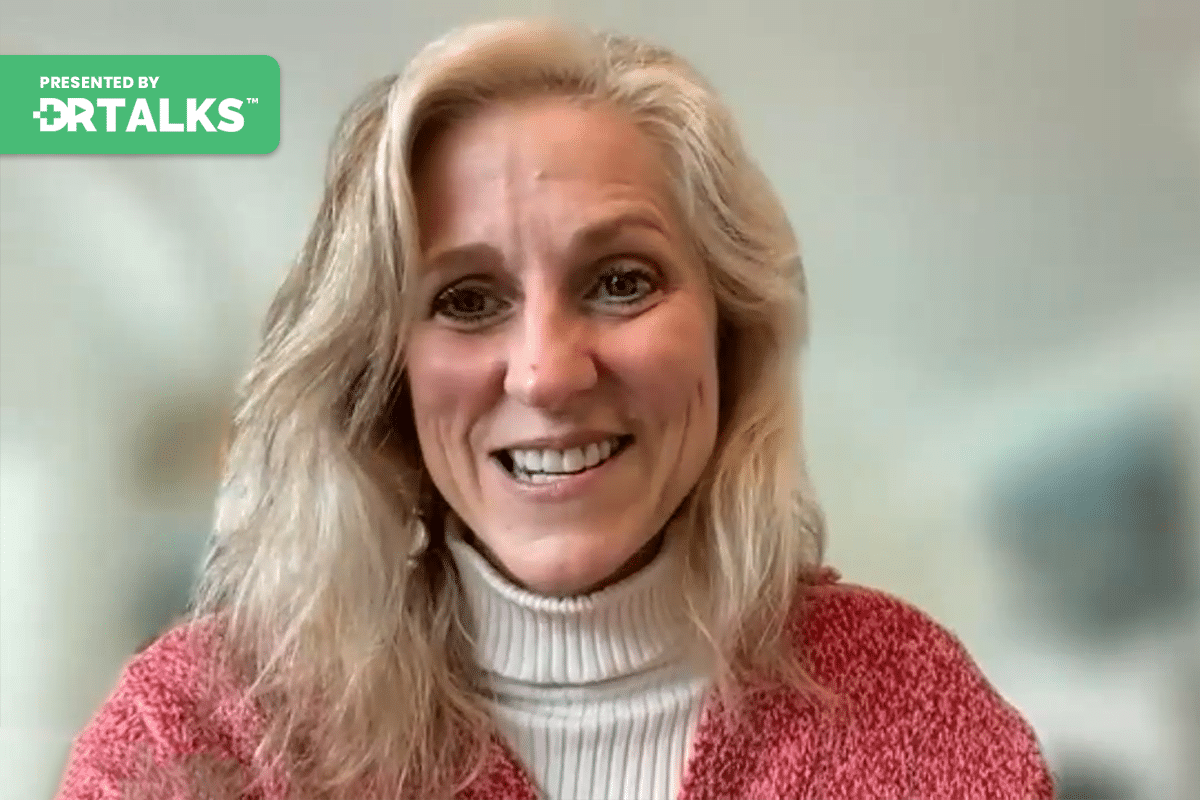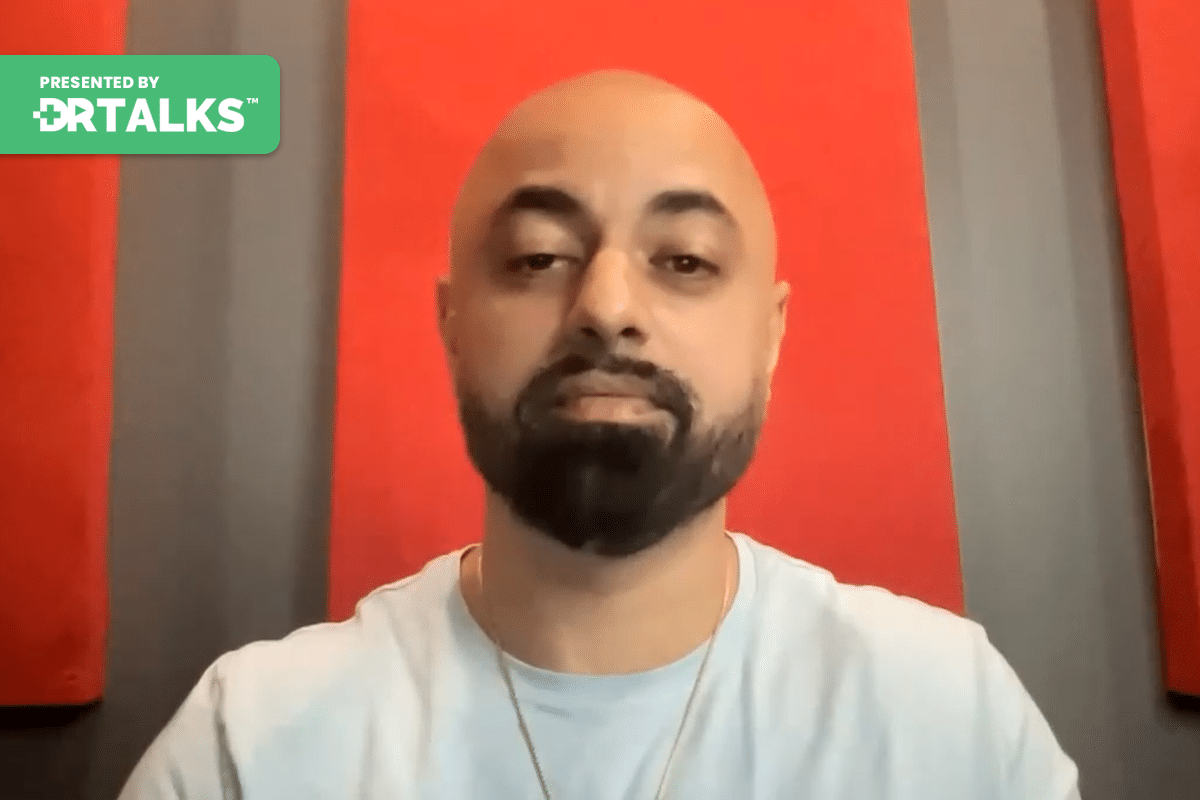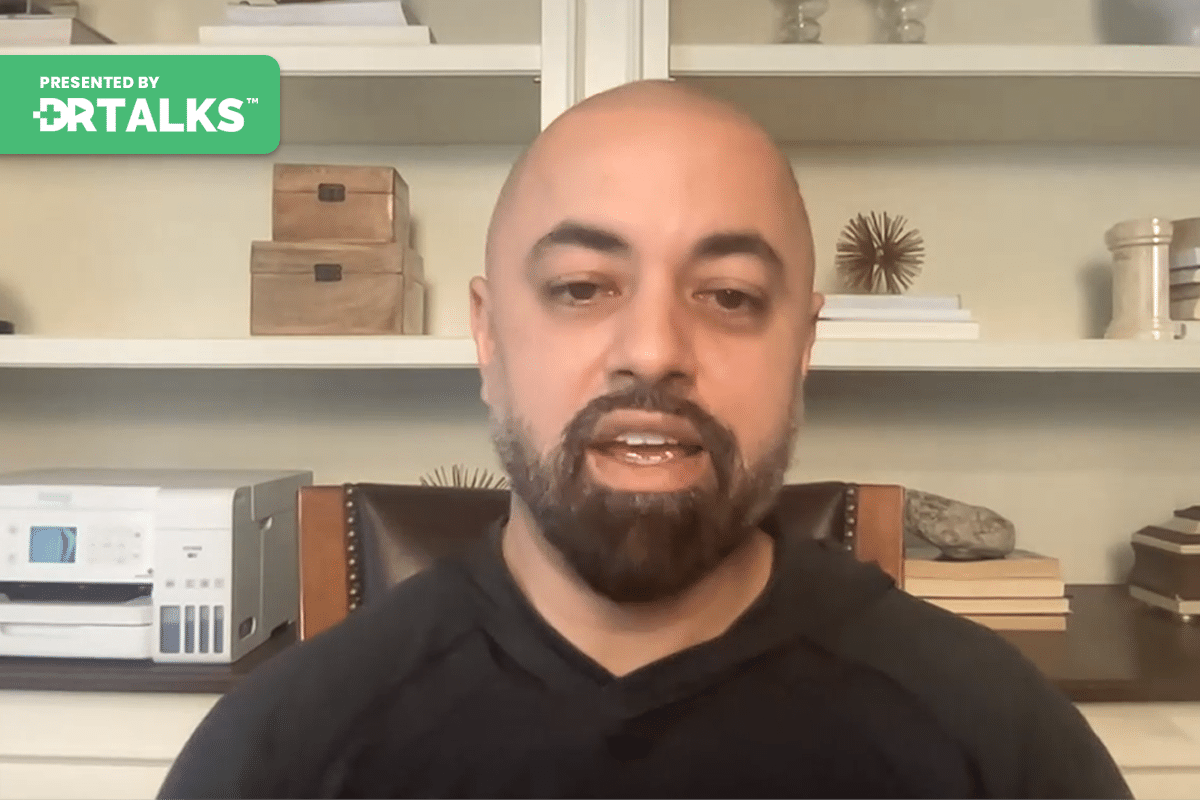Join the discussion below

Kashif Khan is the Chief Executive Officer and Founder of The DNA Company, where personalized medicine is being pioneered through unique insights into the human genome. With the largest study of its kind globally, The DNA Company has developed a functional approach to genomic interpretation overlaying environment, nutrition, and lifestyle... Read More

Dr. Edward Walker is a scientist and lecturer, who believes that developing a healthy relationship with food is key for long-term wellness. He completed his PhD at the University of Auckland on the antioxidant effects of berry fruits, and has continued to research how dietary plant compounds can improve health... Read More
- Uncover how Amarasate plays a crucial role in suppressing hunger
- Align with a natural path, designed in harmony with your body rhythms
- Stay informed with the latest university research on hunger-free fasting
Related Topics
Appetite Suppressants, Appetite Suppressing Hormones, Bitter Taste Receptors, Boosting Glp-1, Cck, Clinical Trials, Empirical Data, Fasting, Food Cravings, Gastrointestinal Tract, Glp-1, Human Biology, Hunger Suppression, Master Hunger-free Fasting, Menstrual Cycles, Natural Ways To Suppress Appetite, New Zealand Hops Extract, Pyy, Supplement Industry, Water-only FastingKashif Khan
All right. Welcome back, everybody. We have a cool competition for you here today. This is something that I wish I knew earlier, because when we’re all on our journeys of learning to implement something that can be as difficult as intermittent fasting, it’d be really nice to have a shortcut or a hack or something that just makes things a little easier to do. And in the context of learning how to not eat, you know, that can be a struggle. It’s easy to quit, it’s easy to fail, easy to cheat, you know? And so we have to have brilliant work that’s been happening over in New Zealand and it’s around. In fact, I don’t think I’m going to steal the thunder because we had the doctor here today. So Dr. Edward Walker is here with us today. First of all, thank you for joining us.
Edward Walker, PhD
My pleasure to be here.
Kashif Khan
So I was about to go on a rant about your product, which is better for you to do that and the other which on your side. So it’s really cool because this is a question that people keep asking. You know, I wish there was something that just made it easier. And you find things like Ozempic and stuff and it’s just not the right answer. But you do have something that I think is the right answer. It’s a lean, natural way to aid somebody. So let’s jump right into it. Let’s let everybody know, because I don’t know. Most people don’t know what is Amarasate. And, you know, how is it discovered? How did this come to be? Because I know you’re part of that research, so let’s just dove into. What is it?
Edward Walker, PhD
You know, so Amarasate is essentially a really, really bizarre hops extract. And it’s encapsulated and targeted to release and in the gastrointestinal tract, in your upper gastrointestinal tract and the way it works. Right. So I guess is a bit of a backstory. In 2010, we started a government-funded research project here and here in New Zealand looking for plant-based appetite suppressants. So trying to find a way to reduce appetite with a product. And the approach we decided to take was to look at the target in the gastrointestinal tract. So you’ve got you since the your GI tract. And the reason for that was because the GI tract is very easily too easy to access. So if you take an old pill, it’s quite easy to get something into the gut, but it’s quite hard to get that active component into the blood. So we targeted the gut and the system we looked at targeting was basically bitter taste receptors. So we were looking at targeting these taste systems in your gut. So what we know is we know that taste is used to inform your body whether something is good to eat or not. So if you think of putting something sweet on your tongue but you eat something sweet and tastes really good, you want to have more? Now, if you were to get that same sweetness and put it in your stomach, your stomach actually has a series of basically sweet taste receptors which tell your body that it likes it so it’ll be detected. And then you go, Okay, I like that sweetness in my stomach. And it will send a hormone signal to your brain that tells you you’re hungry and asks you to eat more food, in which case the signal was.
Now, if you take something very, very bitter, you put that on your tongue, you want to spit that out. If you take that same bitterness and you put it down past your stomach into your upper small intestine, where you normally absorb your nutrients from that, then your body says, Well, look, I told you that wasn’t good to eat when it was on your tongue. I’m going to stop you eating. I’m going to do this by releasing an appetite, suppressing hormone from the gut goes to the brain. And those hormones are essentially GLP-1, CCK and PYY. GLP-1 is very topical at the moment because that’s essentially the system that goes in that can go be targeted. So we did a to discover this. We, we, we did three main studies to start with. The first one was to verify that the system really did exist in the gut. So we looked for biopsies, took biopsies all down the gastrointestinal tract and looked for these bitter taste systems and looked to see if they were localized with appetite-suppressing hormones. So GLP-1, k, etc.. And so we went to hospital and got people to volunteer to have either a tube down their throat or two, but the other way and biopsy samples were taken. So all down all along we tracked and what we could show is that these bitter taste systems were present all the way down we go. So we knew they were there and we knew that with the appetite suppressant hormones, we then got the cells, these little cells you have in your gut that have these bitter taste receptors in them and that have the appetite suppressing hormones. We grew them in the lab.
And we screened almost a thousand different plant extracts and compounds to see which compound or extract would stimulate the release of these appetite. Suppressing hormones. And so by doing that, we went through and we isolated that the best. Probably compound was a particular cultivar of New Zealand Hops and that was really effective. Stimulates the release of a lot of appetite suppressant performance in the lab with using just quite a small amount, then we did a follow-up clinical trial where this whole extract was given to a series of this. Essentially it was men an al before meal and we measured the release of appetite-suppressing hormones in response to that meal. So given that, given this hops extract and some other site compound, they were asked to eat until full comfortably full and blood samples were taken to show how much basically appetite-regulating hormone came out. And what we could show is that they would eat meat around sort of 15, 20% less food, but at the same time they had an increase of a doubling in their response to the meal of GLP-1 and CCK and extended levels for a period of time. So not only do they eat less food, they had a prolonged response of these appetite-suppressant gut hormones. So that was sort of I guess the first piece of work we did, and that was really that was done. And the first study was the biopsy study was done in 2012. And then the appetite suppression study was done in 2014. And that was really exciting to us seeing that GLP-1 response, seeing a quick response and seeing a decrease in food intake as is really powerful. And this of course was all before really Ozempic and everything was on the was on the cards. And for us it was, it was interesting because it wasn’t, it wasn’t like we were trying to develop a commercial product. We were just trying to discover science. And it just happened, you know, along the way it became something that could really help people. And so that’s why we ended up having bell women commercial products.
Kashif Khan
And it’s a beautiful story because, you know, most of what we find in the college Supplement Wellness World doesn’t have the research we have behind it. You know, not to say it’s not useful or beneficial, but the empirical data and the level that you went to to actually like clinically, you know, take biopsies, the word biopsy is and used in the supplement industry, right?
Edward Walker, PhD
Yeah.
Kashif Khan
It’s foreign. It’s completely foreign. But that is very deep empirical data to then truly understand human biology and what to actually trigger it. So essentially, I mean, I know you probably don’t make this claim, but you’re saying that I know how it works and I can turn on the same hormones and with a supplement, right?
Edward Walker, PhD
Yeah. So that’s essentially what we’re doing. We’re boosting up GLP-1. So instead of it was the input, which is a synthetic version which you inject and you get this very high level of synthetic GLP-1 activity for a long period of time. What we do is we boost up your body’s natural results. So, you know, and so this same same hormone or same same mode of action for a well known but a more gentle sort of natural approach.
Kashif Khan
And so the outcome is so now we’re talking in the context of fasting. So it’s not like you’re taking a pill to burn your fat. It’s not like you’re taking a bill to do anything other than suppress appetite to make it easier for you to not be hungry.
Edward Walker, PhD
Yeah, that’s right. Yeah. And so, I mean, so we’re down to two acute fasting studies as well. So after that first period of work, the question really became, well, okay, so you’ve done what you’ve done like a model system. You’ve shown you’ve shown the science, you’ve shown the you’ve taken the boxes, you’ve shown the taste receptors in there. You’ve shown you can release these hormones in people in a sort of a model system. What about if you apply it to an actual diet strategy that people undertake? And so we looked at what to choose and we said, well, probably the best approach is a fasting type diet. And the reason for that were a couple. One, because historically there’s evidence that business has been used by various cultures to suppress appetite during fasting or during times of famines.
So this is evidence from the highlands of Scotland that they used the heat up to suppress hunger during times of famine. And there’s also evidence that a bit of cactus was used by in the Kalahari, by hunters to suppress hunger and thirst when they were going on hunting trips. So there was evidence around Christmas and fasting. We also chose fasting because fasting is can be quite challenging for people and particularly challenging around hunger and food cravings. And these are two, two things we really thought would be likely to be addressed with the MRSA product that, you know, we could knock down hunger, we could knock down food cravings. And if you do that, then you enable people to fast more effectively. So the first study was the excuse me was done in 30 males and they were asked to do just just what we tend to start all of our research in males to start with and then follow up with the female trial. The reason for that is essentially due to menstrual cycles and that it’s just it’s much faster to do the study in men if it works similar results in females. If it doesn’t work in men then there’s not really the not really rational still of females. So we started in men. They were asked to fast for 24 hours. The water only 24 hours fasting. We chose that because it was challenging. We wanted people to have a challenging, you know, a diet strategy.
And we gave them a morisset during the last 8 hours of that fast. So from 16 hours through to 24 hours, they were given a dosage of 16 hours in a dosage, a tool. That period was chosen because again, that’s the time when people really start to smile when they say, look, I’m, you know, too hungry. I got to eat my food. Cravings are through the roof. So we gave it to them and we asked them, how hungry you feeling, how fully you see them, etcetera. And what we could show in that study was that the guys were essentially they had about 80% of the increased hunger that experienced between the 16-hour and the 24-hour time point that was reduced by that. That hunger was reduced by only a small additional increase and they also had pretty much no increase at lunchtime. So at lunchtime during that period of time they didn’t get a sort of lunchtime hunger boost, which is what you typically experience. So mealtime hunger was blunted. That was a really powerful result for us. And we then followed that up with a study in females. So we recruited we into the study was 27 females and they were taken through the exact same, exact same protocol with 24 hour water only fasting last 8 hours measured with a lower site given at 16 hours and 20 hours into the first.
And they were measured for hunger, but they were also measured for food cravings because quite often you with female participants, they experience higher levels of food cravings and males do. So we measured food cravings and in the study we also put in rebound eating assessment. So that was at the end of the 24 hours we gave them a meal and said, Look, eat this meal until you are comfortably full and we’ll see, see how much you eat. So you know that rebound at the end of the fast and what we could show in this study as we showed over that last 8 hours of the 24-hour fast, the hunger values essentially didn’t increase at all. So the MRC completely blunted that increased hunger, and it also blunted more than lunch to basically decrease general food craving. So the food craving actually went down during last night hours, and particularly for savory foods and savory treats tend to be what most people crave when they’ve been fasting. That’s the craving that goes up the most. We also, interestingly saw a 15% decrease in rebound eating. So when are only MRSA 15% less than if they were on a placebo treatment? Yeah, so we’ve got some really excellent results and the results in Woman were better than the results that we showed in the male participants as well.
Kashif Khan
And so, you know, when someone’s doing this now, so you’re not actually tasting the bitter flavor because you’re taking the capsule right down to the receptors right. And now how long or the last? It sounds like 4 hours. These are the.
Edward Walker, PhD
Yeah, so yeah. So we get you get typically you get at least 4 hours. So what we see in the studies is if you take it, if you take a single dose, you get 4 hours, but then we give an additional dose. And so it was still working at 4 hours. It may well work longer, but we can definitely say from the studies, 4 hours of appetite suppression may be longer and it will vary a little bit between people as well. So some people will be more sensitive or they will have a longer-lasting appetite suppressing. And some people may be a little bit less and may need more frequent dose. But but we’d be confident, look, 4 hours at least of suppression, of appetite.
Kashif Khan
And now the intention is to raise this hormone and if somebody went on a 36-hour, some people do, you know, 40, 72-hour fast. Right. Is there any negative effect of having that hormone level raised for long duration?
Edward Walker, PhD
Well, I think what I would say is that not with the mechanism that we’re using to raise it. So if you think about when you normally eat a meal, so if you normally have a meal, what happens with these appetite suppressant hormones such as GLP-1 and PYY as they go, they go up and then they go down to, you know, over a course of a few hours, you have this meal response. Now, what we see when we get to the last night in response to a meal, you get this up and it goes higher and then it tails off more slowly. So you have a tail on it, so you’ll you’re modifying the natural response to be elevated and longer. But it’s still an up-and-down process. You’re still going through that natural physiological process. You’re not stimulating more than you naturally could anyway. So, yes. So from that point of view, you’re getting the deal P1 release all will seek when you need it. So if you take the pill around you meal time, you to suppress it to basically trick your body into thinking you’ve had a meal. And that’s very different from if you’re injecting a long lasting synthetic top analog. So if you inject something like Wegovy, then the effective GLP-1 activity is really high and it’s constantly high. So over the course of the day, it goes down very, very slowly. It’s half life is about a week, so you’ll have this GLP-1 elevated all the time. It’s always high when you’re on things like Wegovy. You don’t go through that natural opt-out cycle. And so we with the virus that you maintain that cycle and I think that’s really important for the full consideration, such as safety.
Kashif Khan
Yeah. When we think about I mean the body works in circadian rhythms, right? And when you don’t consider those rhythms, we don’t know what the negative outcomes are going to be. And so when you do something at a dose that’s more in line with what nature would give you, you’re probably aligned to circadian rhythms, but like you said, when it’s synthetic and it’s just keeping you up at a point which is not a natural rhythm, it’s not a rhythm at all. It’s just a flatline. Who knows what’s going to come out of that, you know? Yeah.
Edward Walker, PhD
And that’s part of that’s part of the approach we took from from the very start, one of the reasons why we wanted to target the gastrointestinal tract or the original work in 2010 was because targeting the GI tract is, is quite a safe way of, of reducing appetite because you don’t have to rely on getting you don’t have to rely on getting your bioactive compound into the blood or into the brain. And you’re targeting an appetite regulation system that occurs every time you eat a meal. You’re just making it boost it up a little bit.
Kashif Khan
And so you did this study between men and women. And one question to ask you, just because socially this has become, I would say, just prolific. There’s all these young women, teenage girls that are really struggling with the standards of social media. So is this safe for young people?
Edward Walker, PhD
Yeah. So, I mean, what I would suggest is that if someone is younger, sort of under 16, under 18, and they’re interested in taking something like MRA site that they talk to their doctor about it, there’s no reason for it to be perceived as not being safe. So we’ve got no no indication it will be. But I think that if anyone is younger, it’s always good to have, you know, personalized medical advice. In theory, it should be more effective for younger people than it is in older people. And the reason for that is that just sort of children and teenagers and again, females are more sensitive to bitterness than males. And so if you’re a survey of a teenage lad or a teenage female, you’ll probably more likely to have a positive response. But again, you know, check with your doctor and get a manage through them.
Kashif Khan
And, you know, I’ve seen that over time. So you talked about people that are doing like a cute like 24-hour, 36-hour fast. But over time, people adopt intermittent fasting as a daily ongoing concern. That’s just their lifestyle at that point. So when you’re doing this, like I think of myself as a daily, intermittent, faster and I’m thinking, okay, I can use this tool and just get rid of some of the pain and just, you know, still there. I keep my same schedule. It’s just going to feel different. Is it this this tool is it that eventually your body will sort of catch up and say, well, I’m hungry, this there’s something that’s triggering this release of this hormone and intelligently work around that. Or is it you can do this for years? No, keep working.
Edward Walker, PhD
Yeah. So that’s an excellent question. So there’s because these are the hormones that are released, so GLP-1 echo, etc., because those are released every time you have a meal and they mediate some of the fullness and suppression of hunger you feel for meals, there’s absolutely no reason to to think that they would lose their efficacy over time, because if they did, then as you get older, you just suddenly don’t feel full from eating because so there’s no reason to believe that there’d be any long term adaption to it. If you look at the pharmaceutical data from Ozempic, where they give, you know, a synthetic GLP-1, this is again, they use relatively long-term weight loss that works until they stop taking it. But so there’s no no suggestion that this should stop working, I think from a long-term usage point of view, what my hope was when I was developing this product was that people would use it to help with dietary change. So you would use it as a tool to to change your diet over time and that eventually you wouldn’t need it. But so you developed habits that you know, that you could then use as a tool to develop the habits, the healthy, healthy food habits, and then use them long term and not need it. That was the goal. But there’s no reason why you couldn’t continue to take the lighter side if you felt you needed it.
Kashif Khan
Hmm. I see this as like, you know, if you think about American culture, you know, I’m guessing New Zealand is not going to be too far off in this piece. But there’s this phenomenon around nighttime eating because of Netflix binging. And I think I just read the other day that 30% of calories that American received are after 8 p.m.. And so and it’s not the right calories. Right. It’s chips and cookies and ice cream. And because you’re sitting there with the family, you’re on the TV and you just don’t stop and keep going, going. You’re stressed from the day, you know. And so it’s this emotional meeting. It’s this coping mechanism, a therapy, therapeutic eating, right? So there’s settings where, you know, I would even think that there’s some people that don’t even know that there’s a chunk of their day that needs a solution like this to give them better health. Right. And literally 30% of calories come at this time. And there they are, the wrong answers calories. So here’s a tool to make that easier because that’s not an easy thing to change that. I’m at home, right? I’m not busy and around family, around the TV. It’s very difficult to say no. So this is an easy way to hack that? No. Well.
Edward Walker, PhD
Yeah. And I think that a lot of the feedback that you get, the anecdotal feedback, is that it takes a lot of taking the product can take the noise away. So what that means is that you’re not you’re not suddenly having these, you know, like food thoughts all the time. You know, you can be more clear about it. And if you’re not if you’re not getting these, you know, foods or triggers, it’s much easier to make healthy food choices or or to choose not to snack at all for sure.
Kashif Khan
So now one challenge that we’ve seen with Ozempic now that has been out for a few months of people using it is that people are losing muscle mass, not only fat. And I don’t know if that’s the issue with the drug or is an issue of people maybe not knowing when to stop. And they’re they’re just under-eating. You know, how where is that lying? How do you know? And is this an outcome of the drug? And maybe I don’t even know this is part of your research or not. But there’s fear of losing muscle mass and not being healthy after all this happens.
Edward Walker, PhD
Yeah. You know, so I mean, we definitely the in the medical field, the doctors are very, very concerned about that. I mean, we’re not we’re not sure why it happens. There’s a tendency to lose muscle mass when you lose weight. I mean, that tends to be what happens. So you lose fat, you lose muscle mass. I mean, I would hope that if you’re trying to lose weight, that you do it as part of a holistic approach, a lifestyle change. So one of the I guess one of the things that I am concerned about is that people look at something like Ozempic or Lugo, the or even Mars diet, and they see it as a like a wonder cure. But you take this and that’s all you do. You know, I pay my money, I get my drug, it fixes my problem, and they don’t have to change their lifestyle along with it. And so if you’re if you’re losing weight and you’re eating healthy and you exercise, then, well, that helps maintain your muscle mass. So I guess I would hope that if someone is losing losing weight using a viral site, that they’re doing that along with a healthy lifestyle. And that would maintain that would help them maintain their muscle mass during weight loss. Whether a large site would induce muscle mass loss of May. Again, we wouldn’t expect any more than you to lose normally. And again, that’s because we’re all we’re doing is boosting up that natural response. So I see that having that and see that having a small response, we’re just getting that slightly longer, higher that slightly elongated hormone response. We’re not generating, you know, high level consistently. And your body’s still going through its natural cycles. We’re just kicking off a long-term weight loss study now, all of our site. And so we’ll have data and probably in many years time about that’ll tell us so about the weight loss and the muscle mass and whether it’s retained. But we’d expect it to be the same between our site and placebo treatment.
Kashif Khan
Yeah, I think, you know, what you said is really the answer, that when somebody is on any healing or wellness type journey, including burning fat or just fasting, there’s no single lever you pull, right? You have to be ready on all fronts. So it’s not just don’t eat, but also how do you train? What are your relationships look like? What are you breathing right when you break your fast? What did you actually eat? And so that that speaks to the culture of Mozambique, which is, give me a shot, the miracle cure. And I’m not doing anything else about changing my hobbies. I’m still metabolically unhealthy. I’m still going to have, you know, one step away from pre-diabetes. If you were to measure my blood, irrespective of what I look like over there. So yeah. So it’s something to be said about knowing that here’s a tool to support and help you, but surround it with other healthy habits. So the entire strategy is aligned to your goal, not just one slice of the strategy. Yeah, you might get there, but not in the best way. Right. So and I agree with you there. Like let’s, let’s incorporate all of what you need to do. So now the you’re in New Zealand, is this like globally where how do people get this product?
Edward Walker, PhD
So it’s so I’m just a scientist, so I don’t I don’t do the sales and I don’t get I don’t get any kickbacks for sales either. I signed away my rights to the patent. So I’m in America. It’s available. There’s a website, I believe. So the color code is the brand name of the.
Kashif Khan
Okay.
Edward Walker, PhD
The company that sells it, but it’s also available and it’s been in New Zealand since 2018. It’s and it’s about clients in China as well through direct-to-consumer marketing now. So it’s so it’s own site in every country, but it’s in a lot of international countries now. Yeah, yeah.
Kashif Khan
Very cool. Yeah. I think you’re going to get a lot of buzz and you’re going to get a lot of pushback from certain people who are not going to like that. You’re around. You know.
Edward Walker, PhD
It’s interesting. You said I actually had a I put an abstract in to talk at a obesity conference recently. And one of the feedback was, oh, well, you know, you’ll stimulating GLP-1 naturally. And GLP-1 has a very short half-life. So this could possibly work. And I was like, Well, what you mean GAAP one doesn’t work in the body. It’s a hormone that does nothing. What are you talking about? They were so indoctrinated with the pharmaceutical, you know, you have to do a GLP-1 injectable because it’s got long-term stability. But you don’t you just you know, you just need to ensure your body releases GLP-1 for a little bit longer than it normally does. It was really, really remarkable how much the pharmaceutical industry had got their story into the medical profession already.
Kashif Khan
Yeah. That’s the battle you’re going to face, especially when you have something that actually works. Right. It’s when you’re a threat. They’re going to get into everyone listening, you know, support. Everybody wants the all the innovation and they want the thought leaders to give us something better. But you have to support it when it’s available, right? Otherwise they’re not going to be available. So, you know, it’s amazing work that people like yourself are doing with good intentions that brings things like this to market. Right. And now all of a sudden, we have a very clean, healthy way and serendipity is the it’s coming out at the similar time to something that’s a little more problematic. Yeah, you’re kind of claiming the same thing, but the way to get there is very different, right? It’s, it’s a very clean it’s the way, again, aligned to the circadian rhythm. It’s the way the body wants it done.
Edward Walker, PhD
Absolutely.
Kashif Khan
Yeah. And if you do it the way the body wants it done, then you don’t have to worry about the potential problems because you’re not doing anything that the body isn’t already doing. And you just stimulating it to just continue, right? Absolutely. Yeah.
Edward Walker, PhD
And that’s the way we should approach things if we can. You know, there’s your body likes to it likes to be a certain way. And if you can if you can lose weight in a way that, you know, that supports the natural process of losing weight, rather than as a sort of a hammer that comes in and says, no way, completely changing your physiology to induce a large change, that’s way better for you.
Kashif Khan
So one last thought before I would take an all your time. So I’m taking this pill and the sensors receptors in my gut track make me release the hormone. Is there in consideration in my diet in terms of I perhaps don’t want to eat bitter foods or I may overdo it like does it matter what I’m eating it? Well, it shouldn’t matter what.
Edward Walker, PhD
So one of the things that I really like about this approach is that it doesn’t matter what diet strategy you’re choosing that it because it regulates appetite, then it helps with all of them. So whether you’re or whether you’re doing fasting, whether you’re deciding to do like low carb or low fat or, you know, a Mediterranean diet because it’s applicable to all of them as far as the business goes, your your gut is what I’d say, quite insensitive to business. So it has to be really, really strong in order to to have a stimulate these hormones. So if you take something, if you were to take one of these MRSA collective capsules and you were to cut it open and put it on your tongue, you would not believe how bizarre it is that it is. It is really, really potent. And you need that really potent, concentrated business in the gut to stimulate these hormones. So if you have a normal foods that are slightly bitter, you know, it’s not going to have any effect. It’s still going to be just as the MRSA will be just as effective as it was if you were eating business at all.
Kashif Khan
And I know I said that was a last thought, but there’s one more when you say that the potency of the bitterness in the research, in the study population you worked on, was there any GI tract type issues like any GERD reflux type issues or.
Edward Walker, PhD
Yeah. So we get occasional gastrointestinal tract side effects. So when you look at almost like GLP-1 and think what you have is you have a response protocol and this is this is true with any biological response. So if you go to bioactive, you will always go to a no effect range activity range at a scientific range. But that’s the way it goes. So for the to go people, I don’t think what it is is it’s no effect, no effect on appetite. You get a true appetite suppression range and if you go a little bit higher, you go into a GI side effect range. And for this product, what we tend to see is the most common one is a gastrointestinal flushing. So what you basically do is your, your, your GLP-1 get a bit higher and your body thinks, alright, you know, I’ve got this thing in there, I probably shouldn’t have eaten, I’m going to flush it out. So you get a gastrointestinal flushing and that will tend to go away if you take the product for a few more days or a week. So it’s okay. That’s the most common if the pill doesn’t open in the right spot, so it doesn’t open in your small intestine and it opens in your stomach, which can happen occasionally to people, particularly if they’ve if they’ve got a full stomach when they’ve taken it, then you can get some reflux type side effects. And the reason for that is the bacillus’ potent bitterness in the stomach causes a secretion of stomach acid, and so it doesn’t deliver in the right spot. You can get some of those ones. But if that happens, the tendency would be to try, take it a different way, try to take until earlier in the morning when you got empty stomach. It’s more likely to get through to the right spot then where you try and modify how you’re taking the pill.
Kashif Khan
Yeah, makes sense with the I mean a couple of things to look out for and with the massive benefits it provides, you tweak a little bit and find your way. Like not too much water, not too much food, right? You’re not going to go lie down right after and, you know, have a kickback up. So easy to look around.
Edward Walker, PhD
We saw in the fasting study and in the miles we had over there was listen, I think it was about 5% of people had 5 to 10%, got the flushing on an acute dose and that’s about as bad as you’d expect it to be because we’ve taken people who’ve never had it before and we’ve given them the maximum dose. So no, no adaption over time for them such as bad you think it and think we had one person out of 30 experienced nausea so they quite their low rates and certainly when you compare them to something like Wegovy V type drug they’re minuscule in comparison.
Kashif Khan
Yeah.
Edward Walker, PhD
The other thing I’d say is if someone’s worried about the side effects like perhaps they’ve taken go before and it had a side effect because we’ll go to all those sort of Semaglutide type GLP-1 drugs because they give that very high level of GLP-1 activity that’s consistent for a long period of time. The side effects can be consistent for all. They can last a long time because we’re boosting up the GLP-1 that’s coming back down. If you do get the side effect, that’s short-term and transient. So you’ve got to say, okay, the side effect with that, those taking it this way, you can always tweak it. It’ll go away in a few hours and you can try a different approach.
Kashif Khan
That makes a lot of sense. This is an awesome discussion, an eye-opening, you know, it’s really awesome to see something that’s so science-based that started off as research. And it’s funny because our business started off the same way. You know, the genetic testing that we do started off as a genetic research company, had no intention of going out there and offering tests. And then we landed on seeing people heal. It was like, Wow, everybody needs this. And then it became commercial and you kind of went down the same path, which is interesting. I was like, Hey, I’m going to study this thing and it looks good. And weight is I got to put this in a pill because everybody needs this.
Edward Walker, PhD
Oh, no, no. My decision that was you know, other people just got hold of it. It was left up to me. I just sort of quit doing science. But fortunately, there’s people who got them who sort of saw the opportunity to help people so they could and they could say, look, you know, we’ve got this. We really should do something with it. We one of the one of the advisors we had on the initial program, they said, well, if there’s sort of an appetite for addiction, and they said, well, I’ve never seen anything like this before, but I’ve never seen these kind of human results, these kind of appetite effects from the product before. You really need to do something with them. So I guess we should then. And so that’s where this all came from.
Kashif Khan
Makes sense. So it’s a pleasure, a great discussion. It’s going to be eye-opening for people. It’s amazing to have a shortcut, you know, and a hack call it. It just makes the job so much easier. You know, I actually am going to take it right now because I’m for me, it’s I know you’re in New Zealand, it’s 9 p.m. for me and I’m trying not to eat late. I shifted my fasting window a couple of days ago. I used to fast until like five or 6 p.m. and then eat two degrees. So I’m trying to reverse it and eat more during the day and shut off at night just to see how it changes just experimenting. So I literally was waiting to go pop a pill so that I don’t open a bag of potato chips and watch TV. And so I report back.
Edward Walker, PhD
To watch TV. You’re just not allowed the potato chip out.
Kashif Khan
Okay. So thank you again. This is a pleasure. Awesome discussion. And everybody, check it out. It’s Calocurb in the US, as we said. Take a look. Try it out. I’m sure you’re going to love it.
Edward Walker, PhD
Thanks very much.
Downloads

